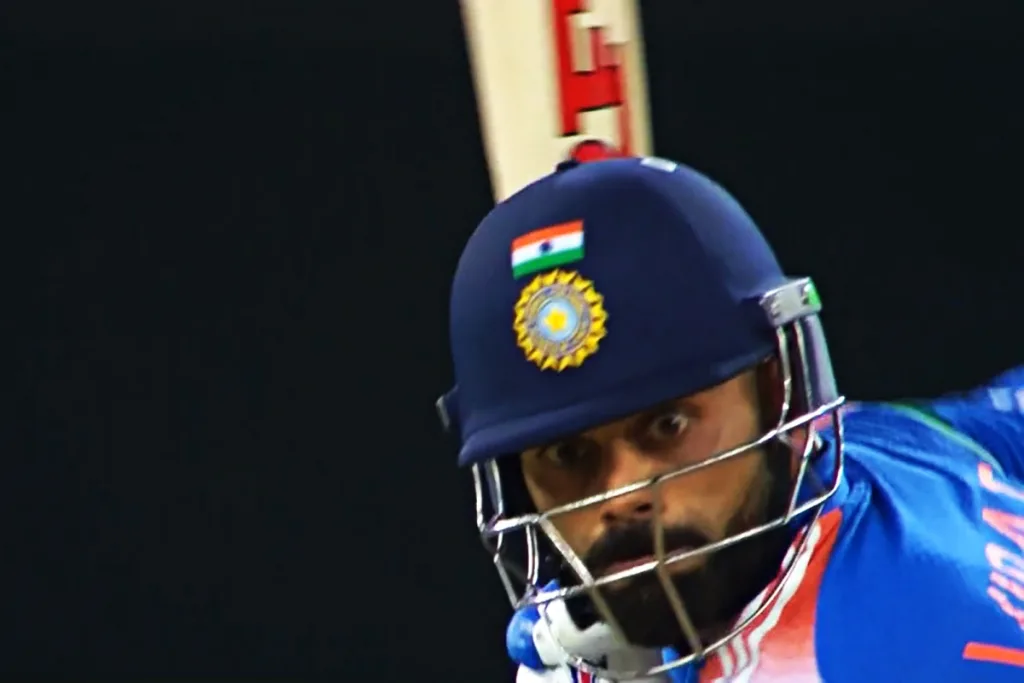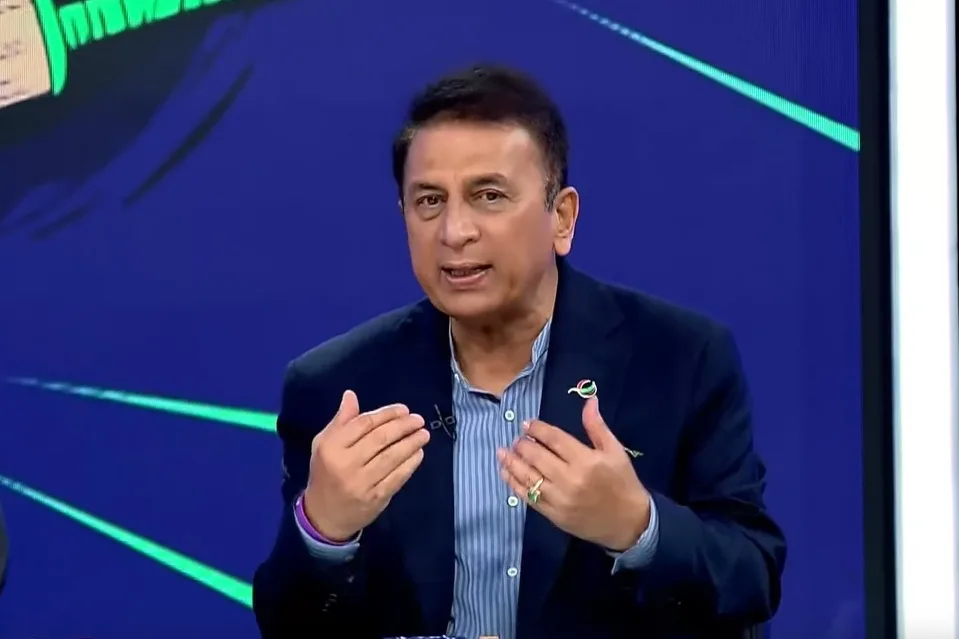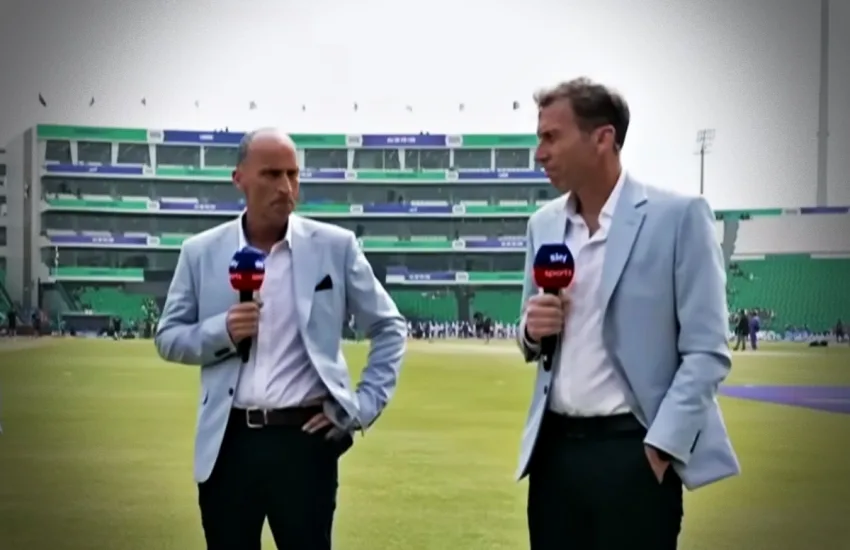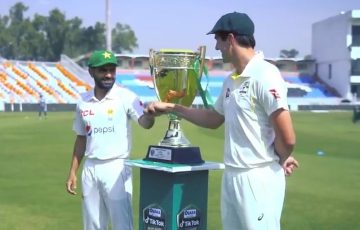We’ve got to be honest with you. We don’t believe that India has maintained a hostile relationship with Pakistan all these years so that its men’s cricket team could gain an edge in the 2025 Champions Trophy. That doesn’t mean that playing all your games at the same ground when everyone else has to travel isn’t an advantage though.
There are certainly times in international cricket when India throws its weight around and there are certainly times when the team has it easier than others. These two things aren’t always conjoined.
If, say, Mike Atherton and Nasser Hussain suggest that India has some advantage in a particular competition, it doesn’t necessarily mean that they’re accusing the sport’s most influential nation of abusing its clout.
It will, however, be quite easy to find an Indian pundit who’ll be willing to take it that way.

“What about the advantage India have in playing in Dubai – only in Dubai – which seems to me to be a hard-to-quantify advantage, but an undeniable advantage,” Atherton asked Hussain before the Pakistan match.
“It is an advantage,” agreed Hussain. “So, the best team in the tournament have that advantage. And I saw a tweet the other day saying, ‘Pakistan host nation, India home advantage.’ It sums it up really.”
That was the misstep perhaps, framing it as ‘home advantage’. It’s not that, exactly. It’s more of a home-from-home advantage; a second home advantage; a not-quite-so-away advantage.

Laying it out a little more clearly, Hussain continued: “They are at one place, one hotel; they don’t have to travel. They have one dressing room. They know the pitch; they have picked for that pitch.
“They were very smart in their selection. They probably knew what Dubai is going to be like. They picked all their spinners, there was a bit of debate with Indian media saying why haven’t you gone for an extra seamer? Why all these spinners? Now we can seen why.”
All of this is true.

India have still had to play well to win their games, but there’s been slightly less to think about; a lightening of the mental load; a narrower and therefore sharper focus.
Rohit Sharma says the pitches they’ve played on have differed – but only to the extent that immediately adjacent strips in the same stadium in Dubai can differ. He also points out that Dubai isn’t in India and that it is “new for us too” – but it is a lot less new when you are basically living there and everyone else is flying in from Pakistan.
None of this guarantees anything – but it helps. If everyone else is traipsing about, playing at different grounds, not even knowing where the final will be should they qualify for it, then they simply have more on their plate.
India ending up with a home-from-home doesn’t have to be some grand conspiracy to still amount to an advantage.

“Why don’t you actually look at why your team has not qualified?” whatabouted Sunil Gavaskar when he heard about Hussain’s comments. “That’s what I was going to ask you, sir. Rather than constantly focusing on India, are you even looking at your own backyard?”
The answer, in this instance, was that England’s backyard wasn’t all that relevant when previewing a match between India and Pakistan.
Displaying skin so thin as to be almost translucent, Gavaskar irrelevantly continued: “They are always moaning. They just cannot seem to understand where India stands in international cricket; in terms of quality, income, talent, and, more importantly, in terms of generating revenue.
“India’s contribution to global cricket, through television rights and media revenue, plays a massive role. They need to understand that their salaries also come from what India brings to the world of cricket.”
We’re pretty sure Athers and Hussain understand this. In fact it’s possibly why they were devoting time to discussing India and the advantages the team has had in this tournament.
The fallacy of fairness
India didn’t demand to play all their matches in one place. It’s just that their government didn’t allow them to travel to Pakistan – the same position they’ve maintained for the last 16 years. Positioning them in the UAE was therefore considered the least ludicrous workaround. This is just the way it has gone – but that still results in an advantage.
Highlighting an advantage does not amount to complaining about it. Similarly, failing to acknowledge one doesn’t negate its existence.
Advantages and disadvantages are everywhere in cricket. Every match starts with a coin toss and one team or the other gaining an advantage. Rohit’s been losing all of these – that’s been a disadvantage. India are the only team playing the whole tournament solely at one ground – that’s an advantage.
Cricket is an imperfect sport in an imperfect world and its trophies are not lab experiments.
Get our email: Here’s the link.






Not just that the comments were made when reporting on a match between India & Pakistan, but the fact that Atherton & Hussain were part of a commentary and analysis team that was working for a sole broadcaster at an international event. They were not commenting in their capacity as English people or former England players.
“Your team” and “your own backyard” is utterly inappropriate language to use in those circumstances.
Had someone from the England squad or management team made those comments, Gavaskar’s comments would have had some validity, I suppose.
Sunil has always struggled with reacting appropriately to ODI cricket. We are very close to the 50th anniversary of the very first World Cup match- scorecard below. I draw readers’ attention in particular to Sunil’s personal contribution:
https://www.espncricinfo.com/series/prudential-world-cup-1975-60793/england-vs-india-1st-match-65035/full-scorecard
I suppose it is fair to say that, in 1975, it was an alien format in an alien environment for young Sunil, but it is still a scorecard that is hard to understand as anything other than an act of passive resistance.
Some great names on that scorecard, both sides.
Just one of the all-time great ridiculous innings.
Would you like a match report on’t? My diary records my watching of that match on TV. Otherwise I’ll simply Ogblog it in my “Fifty Years Ago” series (come June) and comment in a link.
A pity that cricinfo hasn’t produced a worm chart of the 2 innings in that match.
Think this is an occasion when the action itself really would have to be front and centre, Ged, but thanks.
I think you are right, KC. This is Ogblog territory, as the most interesting thing about the diary entry is the language I used and the peripheral matters on the same day.
Racked up at pace – apologies if there are spelling/typo errors:
https://ianlouisharris.com/1975/06/07/a-tale-of-two-cartoons-and-an-historic-yet-cartoonish-cricket-match-7-june-1975/
Cricket and cartoon lovers alike should enjoy.
I was at Lords that day,it was a very hot day,to this day I still don’t know what happened to Sunil Gavasker.If any body has heard SG’s reason for batting like that,I would love to know.
Really doesn’t help address a perception that the situation favours ‘your’ team when your response to that criticism is not ‘no, this isn’t unfair’ but rather ‘how dare you suggest the rules should apply to us? We have lots of money!’
That last sentiment seems to be very much the zeitgeist at the moment then, Sunny G could be looking at a future in politics in [insert country here, sadly many would fit].
“in terms of quality, income, talent, and, more importantly, in terms of generating revenue”
Yep. And sad to hear SG presenting “generating revenue” as more important than quality and talent…
I commented about this a few posts back, but I’m actually sympathetic here to India’s position, both the cricket team (whose fault this clearly isn’t) and even the government itself: allowing the team to tour is a tool of geopolitical significance. We all like the idea of sport trumping politics, or at least being somewhat independent from it, but the Indian team heading to Pakistan would be a big deal. If the government are going to finally authorise it, that should really form part of a programme of rapprochement at the diplomatic level, not just because the ICC happen to have declared Pakistan to be “hosts”. Anything else would be a wasted opportunity.
It’s worth distinguishing the fact the Indian team could not travel to Pakistan from previous cases where teams chose not to travel to a World Cup venue: Australia and West Indies refusing to fly to Sri Lanka in 1996, and the England-Zimbabwe and New Zealand-Kenya forfeits in 2003. Given the circumstances, granting the Indian team their Dubai “home” wasn’t a totally unreasonable thing to do. I’d argue the present compromise is more justifiable than the stitch-up in the T20 World Cup tournament structure that guaranteed India’s semi-final, if they were to reach it, in Guyana – even if the net effect of a permanent base in Dubai favours India even more than that TV money-grab did. But aside from unfairness, it also produced some sheer ridiculousness: like Australia and South Africa both jetting to Dubai for a day at the end of their group stage, because until India played NZ they couldn’t know where their semifinals would be held. Pretty poor for cricket’s Net Zero credentials (to give minimal credit to the ICC, they do at least seem less prone to greenwashing their tournaments than other major sporting bodies do) and utterly unfair on travelling supporters too, though cricket seems to care little for them.
As a general rule, if the “least unreasonable” way to deal with the knots your circumstances have tied you into is to agree to something with utterly preposterous consequences, it’s worth thinking whether you could have avoided those circumstances in the first place. A more competent ICC administration could, and should, have done. India-Pakistan geopolitical tension is not one of life’s newer developments, and certainly not an “unknown unknown”. There were a lot of smiles and pats on the back at the decision to declare Pakistan sole hosts, followed by months of uncertainty as the inevitable wrangling took place on what would really happen. It would have been safer to save such a grand gesture of faith in Pakistan’s ability to host until India had successfully conducted a bilateral tour there – or alternatively, for India to drop out of the Champions Trophy qualification spots. Either would have been a long wait, but it would have saved a lot of farce. In the end, holding the tournament now has just robbed Pakistan of the chance to host a major ICC competition “properly” and so, as they rejoin the queue for other events to be dished out, made it an even longer wait for them.
In fact it’s Pakistan (team, country, population) I feel the most sympathy for, especially after that wash-out in their final group match. Get to host your first tournament 1996. Get to host your first ever ICC tournament that you’re named sole host of – 1987 and 1996 were shared about, though in 1996 the final was held in Lahore. Spend a lot of money doing the stadiums up. And for all that, your only home advantage is to play one home match. Your second match you have to fly overseas even though you’re supposedly, and technically for administrative purposes (I believe those games in UAE are in principle hosted by the PCB not the Emirates Cricket Board), the sole host. You lose both those matches, then your third – a dead rubber anyway – can’t take place due to your own weather. All in all, pretty rubbish. And to rub the salt in, the final will take place overseas, where your biggest rivals are favourites to lift the trophy. This was meant to be Pakistan’s “we’re back on the world cricket stage!” moment. I’d like to say it could hardly have gone worse, though sadly we can all think of ways it could have done – and thank goodness it didn’t. The Taliban-Pakistan clashes that have killed dozens while this tournament was ongoing have all been well away from the matches. But it would be nice to think that in some parallel universe, in a more peaceful Pakistan, the hosts will soon be lifting the trophy in Lahore, preferably after handing Australia a thrashing.
It is indeed Pakistan who’ve ended up with the shitty end of the stick here.
Our point about India is that regardless of how it has come about, they have ended up with an advantage and it is simply disingenuous to argue otherwise.
Yeah, any argument to the contrary is deeply unserious. I’m glad that the pitches at Dubai have been such a mixed bunch since that at least that slightly reduces the benefit of familiarity, but there’s no getting around the advantages of a non-existent travel itinerary.
Having said that, a lot of the social media (and even plain old media) narrative has been that India somehow obtained this advantage by unfair means, and I can see why this rankles Indian supporters. Especially when rival fans can regularly be heard using to delegitimise the achievements of a very fine team and also as a deflection of their own teams’ woes. That is absolutely not what Hussain was doing here and it was ridiculous to call him out for it – am sure the “dispute” was great for the telly ratings and column inches though, so it earns a 10/10 success rating on that front. My guess is this was a counter-blast just waiting to happen and Hussain’s comments promoted him to the most prominent convenient target, however unfairly. The rant wouldn’t have been so effective if both barrels were aimed against “anonymous big-mouths on Twitter”.
I reckon India would be getting less stick over this if it weren’t for that Guyana stitch-up previously. The more special treatment resembles a pattern, the more it undermines the status of ICC events in general. What mystifies me is how little flack the ICC is copping for this. These issues were both foreseeable and avoidable, but nevertheless were walked straight into. It’s often said the ICC is less of a conventional sports governing body and more of an events manager. But partly because it’s so politically driven, its event management is often woeful too.
Henceforth, I will consider all geopolitics in context of their impact on the next Champions Trophy. Makes more sense that way. Clearly, for instance, Australia’s purchase of Nuclear subs from USA came with a Quid Pro Quo of their support for the USA hosting the next edition, and in turn for the Aussies to be based in Atlanta and its [four letter word sport] amenities. On the other hand, Starmer’s reproachment with Europe is tied to a proposal to host the next edition entirely in Burnley in May. Clearly then, we can see the fault lines in the “Special Relationship” and the Western Alliance writ large.